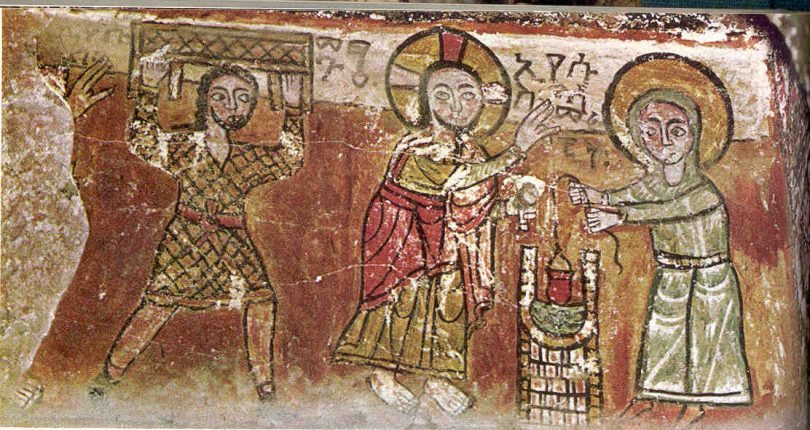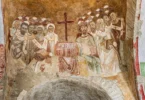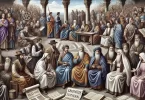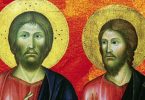It was during the year that Barnabas and Saul were at Antioch that the disciples were first called “Christians”. [1] They were followers of Christ. As members of the populous chose to become ‘Christian’ they exhibited ‘Christ like’ characteristics and thus they were called “Christians” because they acted like Christ. Their behavior, activity, and speech were like Christ Jesus. The word Christian means, “follower of Christ” or “belonging to the party of Christ.” Early Christians had accepted the Gospels of Matthew, Mark, Luke and John as the description of Jesus and followed the ways there taught. There was no Christian church as such. Early Christians did not go to church, they were the church. The people were the Christian church. They met in their homes. These Christians started in the middle a very diverse Roman melting pot of social and religious ideas. By peaceful means, they changed the Empire and united it under the banner of Christianity. They were revolutionaries. They had opened their homes, spoke the truth fearlessly, and trusted God for the results. It was not a political power and it was not forced. Christianity spread by providing a better way of life. The message of ‘be good to others’ with its insistence on ‘Common Decency’ spread by personal choice. These Christians were a fearless and animated people. This was no passive church where one must sit and listen. To be Christian, one had to ‘be good to others’. Christianity, in the early days, was not a political force. That came with the Roman Catholic Church riding on the back of Christianity. So, Christianity is the people acting under the ‘philosophy of Jesus’ with its requirement for ‘Common Decency’. The Church is a formalization of the gathering with a hierarchy that becomes a political force.
We must also be aware that the Early Christians followed the teachings of Christ as enunciated in the words of Matthew, Mark, Luke and John. There is also the later written ‘Gospel of Thomas’, the ‘Gospel of Peter’, and the ‘Gospel of James’. These, and similar, are often called the “Gnostic gospels” for a good reason. Some call these “competing” gospels of Jesus. Early Christians tended to reject these other accounts of Jesus. The dates are a clue as to their rejection. Jesus’ ministry took place in the late 20s or early 30s of the first century. The apostle Paul wrote his letters from the 40s to the 60s. Mark’s Gospel was written by the 60s. Matthew’s and Luke’s were written by the 70s (although there is some disagreement on some dates). John’s Gospel was written by the 90s. The Gnostic gospels were written much later. There is no evidence placing the writing dates of Gnostic gospels before the middle of the second century. Their late dates leads us to doubt their authenticity. So we are talking interpretation. One must read gospels for what they are — another person’s account of what Jesus was telling us. It is incumbent upon us to interpret what Jesus was telling us. The Early Christians acted like Christ. This basic Christianity lives on in us as our mother’s teach us the principles of ‘Common Decency’, in effect using Jesus as a role model. As young children, we are taught:
- Be good to others.
- Be good to women.
- Stand up against wrongdoing.
- Beware of tricksters.
- Don’t take more than you need.
This is backed up with a comprehension of ‘right’ and ‘wrong’ as a moral code. Our mothers teach us the difference between ‘right’ and ‘wrong’, backed up by our fathers. This ‘moral code’ for Christians does not use a rulebook as in some other religions but relies on a general concept of right and wrong. This is strongly demonstrated in the subsequent culture of Christmas where there is a society wide concept of ‘goodwill to all mankind’. We don’t say: “Are you Christian?” If so: “Merry Christmas” otherwise: “Sod off”. It is clearly ‘goodwill to all mankind’. This does not directly come from Jesus, nor from the Early Christians. It has developed as part of the ‘Christian Culture’. All us working people use this a a guideline to our activities. We detect very quickly when we meet somebody whether they are oparating of the same philosophy of ‘Common Decency’. If we detect an aura of ‘Common Decency’ from the same upbringing, we don’t bother checking the change. If they appear to have a different phiosophy, we count our change. Many, but not all religions, exhibit ‘Common Decency’ and we are at ease trading with them. If Common Decency disapears, we need legal documents to transactions and great care on payment procedures. ‘Common Decency’ is not universal. However, those aspiring to power positions often neglect the ‘Common Decency’ inherent in the teachings of Jesus in their quest or power and influence. This is why we get disgusted with politicians and even the higher hierarchy in ‘The Church’. Our nationstate justice system does not operate on expectations of ‘Common Decency’. It operaates on Moses laws that are all negative — “Don’t do this” and “Don’t do that”. There is no law demanding decency.
There are differences between our concepts of ‘Christianity’ and the Church. Being ‘a good Christian’ and ‘being a Church goer’ are not the same thing. Many things happened when the formal Church was created that do not match the teachings of Jesus as recorded by the early gospel writers. Even then, the the writings of the gospels may not exactly match the words of Jesus. It is our individual duty to comprehend what Jesus was teaching and that is best detected by analyzing what your mother taught you when young. That is the message that has passed down over the centuries from generation to generation. It involves more than the logic of the words in the testaments.
In the New Testament, there is no mention of the papacy, the worship of Mary, the immaculate conception, apostolic succession, the petitioning of saints for their prayers, the ordinances of the church functioning as sacraments, infant baptism, confession of sin to a priest, indulgences, purgatory, or the equal authority of church tradition and Scripture. The origin of the Catholic Church does not lie the teachings of Jesus as recorded in the New Testament. We need to delve into the origin of ‘The Church’ which at that time was the ‘Catholic Church’.
For the first 280 years of Christian history, Christianity was banned by the Roman Empire, and Christians were terribly persecuted. This changed after the “conversion” of the Roman Emperor Constantine. Constantine provided religious toleration with the ‘Edict of Milan’ in AD 313. This lifted the outright ban on Christianity. In AD 325, Constantine called together the Christian leaders from far and wide to a meeting, now known as ‘The Council of Nicea’. His intention was to commonize the documentation and concepts of Christianity.
Roman Emperor Caesar Flavius Constantine presided over a group of church bishops and other leaders with the intention of clarifying the nature of God and Christianity. The task was to eliminate the confusion, controversy, and contention among the various leaders. The Council of Nicea affirmed the deity of Jesus Christ and defined the relationship between the Father and the Son as “of one substance.” It also affirmed the Trinity—the Father, Son, and Holy Spirit were listed as three co-equal and co-eternal Persons. So, much of what we see as Christianity was determined by a group of disagreeing bishops in the year 325, almost three centuries after Jesus was nailed to a scaffold. So you must ask yourself: “Is Christianity defined by the Church, or defined by the written gospels of the first century, or defined by later ‘Gnostic’ gospels, or defined by your interpretation of the philosophy espoused by Jesus? I favor the latter. I accept that your opinion may differ.
Constantine envisioned Christianity as a religion that could unite the Roman Empire. His empire was in the process of fragmentation and cursed with division as we now see in countries that have been forcibly ‘diversified’. zzzWhile this may have seemed to be a positive development for the Christian church, the results were anything but positive. Just as Constantine refused to fully embrace the Christian faith but continued many of his pagan beliefs and practices, so the Christian church that Constantine and his successors promoted progressively became a mixture of true Christianity and Roman paganism.
Following are a few examples:
Most Roman Catholic beliefs and practices regarding Mary are completely absent from the Bible. Where did those beliefs come from? The Roman Catholic view of Mary has far more in common with the Isis mother-goddess religion of Egypt than it does with anything taught in the New Testament. Interestingly, the first hints of Catholic Mariology occur in the writings of Origen, who lived in Alexandria, Egypt, which happened to be the focal point of Isis worship.
The Lord’s Supper being a consumption of the literal body and blood of Jesus is not taught in the Bible. The idea that bread and wine are miraculously transformed into the literal body and blood of Jesus (transubstantiation) is not biblical. However, several ancient pagan religions, including Mithraism, which was very popular in the Roman Empire, had some form of “theophagy” (the eating of one’s god) as a ritualistic practice.
Roman Catholicism has “saints” one can pray to in order to gain a particular blessing. For example, Saint Gianna Beretta Molla is the patron saint of fertility. Francis of Assisi is the patron saint of animals. There are multiple patron saints of healing and comfort. Nowhere is even a hint of this taught in Scripture. Just as the Roman pantheon of gods had a god of love, a god of peace, a god of war, a god of strength, a god of wisdom, etc., so the Catholic Church has a saint who is “in charge” over each of these and many other categories. Many Roman cities had a god specific to the city, and the Catholic Church provided “patron saints” for cities as well.
The idea that the Roman bishop is the vicar of Christ, the supreme leader of the Christian Church, is utterly foreign to the Word of God. The supremacy of the Roman bishop (the papacy) was created with the support of the Roman emperors. While most other bishops (and Christians) resisted the idea of the Roman bishop being supreme, the Roman bishop eventually rose to supremacy, again, due to the power and influence of the Roman emperors. After the western half of the Roman Empire collapsed, the popes took on the title that had previously belonged to the Roman emperors—Pontifex Maximus.
Many more examples could be given. These four should suffice in demonstrating the origin of the Catholic Church. Of course, the Roman Catholic Church denies the pagan origin of its beliefs and practices. The Catholic Church disguises its pagan beliefs under layers of complicated theology and church tradition. Recognizing that many of its beliefs and practices are utterly foreign to Scripture, the Catholic Church is forced to deny the authority and sufficiency of Scripture.
The origin of the Catholic Church is the tragic compromise of Christianity with the pagan religions that surrounded it. Instead of proclaiming the gospel and converting the pagans, the Catholic Church “Christianized” the pagan religions and “paganized” Christianity. By blurring the differences and erasing the distinctions, the Catholic Church made itself attractive to the idolatrous people of the Roman Empire. One result was the Catholic Church becoming the supreme religion in the Roman world for centuries. However, another result was the most dominant form of Christianity apostatizing from the true gospel of Jesus Christ and the true proclamation of God’s Word.
Second Timothy 4:3–4 declares, “For the time will come when men will not put up with sound doctrine. Instead, to suit their own desires, they will gather around them a great number of teachers to say what their itching ears want to hear. They will turn their ears away from the truth and turn aside to myths.”
[1] What does the bible say about the word “Christian.” The word is only used three times in the New Testament. Each instance is referring to the first “Christians” of the early church.“…So for a whole year Barnabas and Saul met with the church and taught great numbers of people. The disciples were called Christians first at Antioch” (Acts 11:26).
“Then Agrippa said to Paul, ‘Do you think that in such a short time you can persuade me to be a Christian?’” (Acts 26:28).
“However, if you suffer as a Christian, do not be ashamed, but praise God that you bear that name” (1 Peter 4:16).







